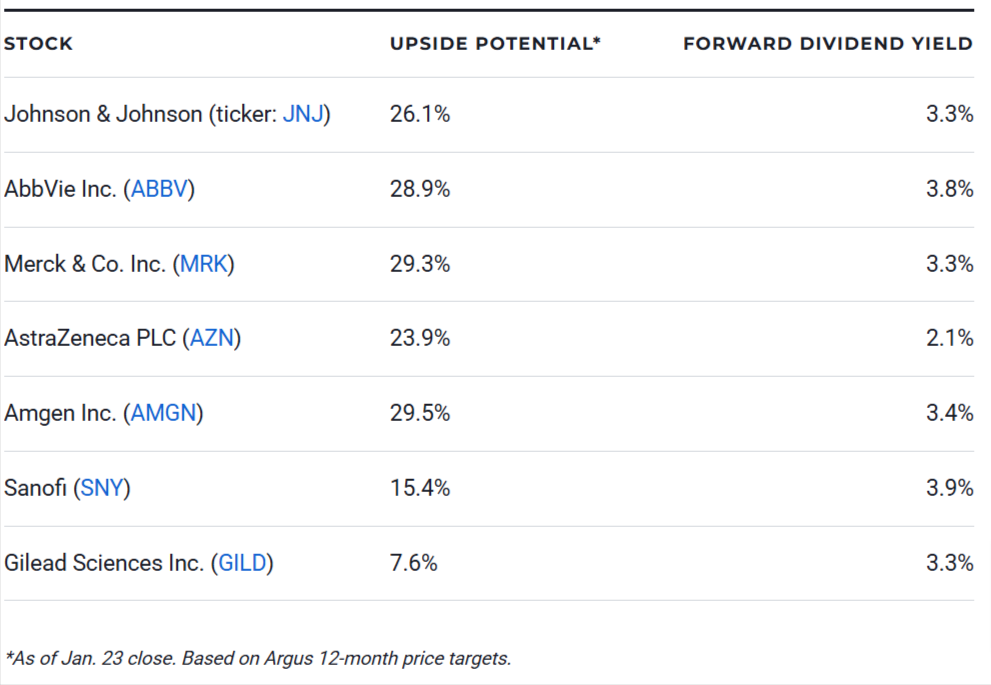The pharmaceutical industry could generate more than $1.2 trillion in global sales in 2025, according to Statista. The cancer segment alone is expected to generate $208 billion in sales this year. The pharma industry is expected to grow 4.7% annually, reaching $1.4 trillion by 2029.
Not only are pharmaceutical stocks excellent defensive investments in an uncertain economy, some pharma stocks pay sizable dividends that can be a source of steady income and help offset the impact of inflation. Here are seven pharmaceutical stocks to buy with dividends of at least 2%, according to Argus:

Johnson & Johnson (JNJ)
Johnson & Johnson is a global leader in the pharmaceutical, medical device and consumer health care products industries. Its key products include anti-inflammation drug Stelara, multiple myeloma and light chain amyloidosis drug Darzalex, and headache and pain relief drug Tylenol. Analyst David Toung says Johnson & Johnson offers investors an attractive balance of consistent pharmaceutical profits and highly innovative, high-growth medical technology. Toung says Johnson & Johnson also has a strong slate of upcoming product launches, including new pulse field ablation products for electrophysiology expected in early 2025. Argus has a “buy” rating and $185 price target for JNJ stock, which closed at $146.64 on Jan. 23.
Dividend yield: 3.3%
AbbVie Inc. (ABBV)
AbbVie is a global pharmaceutical company. Its key drugs include Humira for treating rheumatoid arthritis, psoriasis, Crohn’s disease and other conditions, and Skyrizi for treating plaque psoriasis, psoriatic arthritis, Crohn’s disease and ulcerative colitis. Analyst Jasper Hellweg recently upgraded AbbVie’s stock, citing impressive growth from Skyrizi and inflammation treatment Rinvoq. In the third quarter, AbbVie reported 52% growth in Skyrizi sales and 47% growth in Rinvoq sales. In fact, Q3 was the first time Skyrizi sales exceeded Humira sales. Argus has a “buy” rating and $220 price target for ABBV stock, which closed at $170.67 on Jan. 23.
Dividend yield: 3.8%
Merck & Co. Inc. (MRK)
Merck is one of the world’s largest pharmaceutical companies. Merck reported 4% revenue growth in the third quarter, including 17% sales growth from leading cancer drug Keytruda. Sales for Merck’s HPV vaccine Gardasil were down 11%. Hellweg says Keytruda is the star of Merck’s portfolio, accounting for about 45% of Merck’s total revenue in the third quarter. Despite the stock’s recent underperformance, Hellweg says Merck has consistently identified additional indications and gained fresh regulatory approvals for Keytruda and other top drugs, including approvals for treating lung, gynecological and urothelial cancers. Argus has a “buy” rating and $125 price target for MRK stock, which closed at $96.63 on Jan. 23.
Dividend yield: 3.3%
AstraZeneca PLC (AZN)
AstraZeneca is one of the largest pure-play pharmaceutical companies in the world. Its leading commercial drugs include Tagrisso for lung cancer, Farxiga for Type 2 diabetes and Soliris for paroxysmal nocturnal hemoglobinuria and atypical hemolytic uremic syndrome. Hellweg says AstraZeneca has impressive regulatory approval momentum, including approvals for treatments targeting asthma, endometrial cancer, lung cancer and autoimmune diseases. AstraZeneca also gained approval for an influenza vaccine, and the Food and Drug Administration has granted priority review status to AstraZeneca drugs targeting mantle cell lymphoma, and breast and lung cancer. Argus has a “buy” rating and $85 price target for AZN stock, which closed at $68.60 on Jan. 23.
Dividend yield: 2.1%
Amgen Inc. (AMGN)
Amgen is one of the world’s largest biotechnology companies. Its leading commercial drugs include osteoporosis and hypercalcemia drug Prolia, autoimmune disease drug Enbrel and osteoporosis, hypercalcemia and bone cancer drug Xgeva. Hellweg says Amgen has both a rapidly expanding portfolio of commercial products and a strong pipeline of potential future products. Tepezza was recently approved in Japan for treatment of active or high clinical activity score thyroid eye disease. In the U.S., Amgen recently launched Otezla for treating plaque psoriasis in children ages 6 and older. Argus has a “buy” rating and $360 price target for AMGN stock, which closed at $277.88 on Jan. 23.
Dividend yield: 3.4%
Sanofi (SNY)
Sanofi is a French pharmaceutical company that specializes in atopic allergic disorders, oncology and rare diseases. Its leading drugs include Lantus for treating diabetes and Dupixent for treating atopic dermatitis, asthma and chronic rhinosinusitis with nasal polyps. Sanofi also acquired Provention Bio in 2023, which added Tzield to Sanofi’s existing diabetes treatment portfolio. Hellweg says Dupixent sales have been impressive. The drug was recently approved in China as the first biologic medicine for patients with chronic obstructive pulmonary disease, the fourth leading cause of death worldwide. Argus has a “buy” rating and $60 price target for SNY stock, which closed at $51.98 on Jan. 23.
Dividend yield: 3.9%
Gilead Sciences Inc. (GILD)
Gilead Sciences is a biopharmaceutical company that develops treatments for HIV/AIDS, hepatitis C, liver disease, hematology/oncology and inflammation. Its leading drugs include HIV drugs Biktarvy and Genvoya and antiviral medication Veklury. Hellweg says Gilead is a market leader in HIV and oncology and has reported several positive developments in recent months. For example, primary biliary cholangitis drug seladelpar has gained accelerated approval from the FDA and is under review in the U.K. and E.U. Hellweg projects substantial revenue growth for Gilead in 2025. Argus has a “buy” rating and $100 price target for GILD stock, which closed at $92.92 on Jan. 23.
Dividend yield: 3.3%